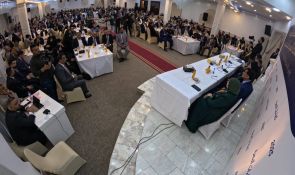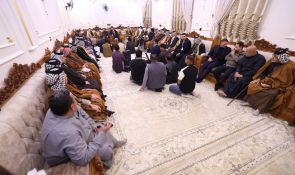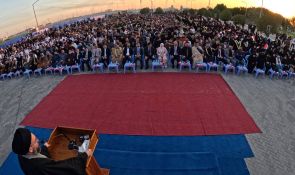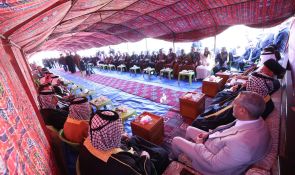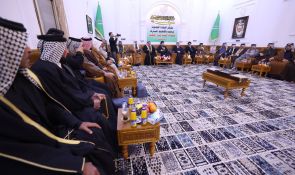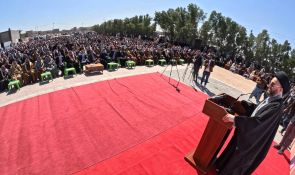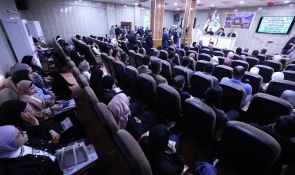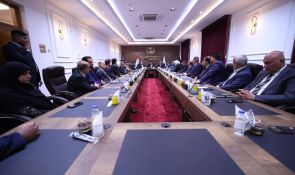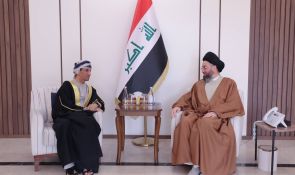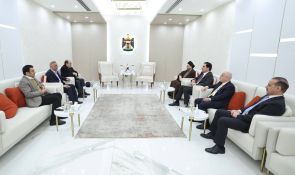SAYYID AMMAR AL-HAKIM STRESSES NECESSITY FOR OFFICIALS AND THOSE IN CHARGE TO PURIFY THEIR SOULS AND THE HEARTS
In the Name of Allah, the most Gracious, the most Merciful. Peace and blessings with our Master and Prophet, the Master of Prophets and Messengers, the one loved by the Lord of the Worlds, the father of al-Qasim, the Chosen one, Muhammed, and with his good and pure Ahl al-Bayt and elite righteous companions.
Respectful gentlemen, good brothers and sisters: First of all, I welcome you with the best welcome in your place of meeting, the majlis of Ahl al-Bayt, Allah’s peace with them.
Covenant of the Commander of the Faithful Ali (Ú) to Malik al-Ashtar represents a sum-up of the command and administration theory in Islam.
Our talk in the past weeks was about the Islamic theory in command and administration. We indicated that the covenant of the Commander of the Faithful Ali, peace with him, to Malik al-Ashtar, when he put him in charge of ruling Egypt, represents a summary of this theory. We reached the eighth section of this covenant and important historic document which puts the touches, the blocks, the clear vision in how to administer and take charge. We indicated that the responsibility we are talking about is not restricted to big leaderships and commands, is not confined to kings, heads and ministers. Rather, it extends to everyone who assumes a position of responsibility up to the family, to the management of this family that needs these restrictions and criteria to be observed.
Necessity of making a good choice
In the eighth section, the talk was about advisors. O official, O one who is in charge: Who are members of the train who surround you? Who are the advisors on whom you depend and what do they say to you? What is the advice they give you? We talked in more than one meeting about the subject of advisors, how reporting people’s faults and shortcomings is done and how an official is instigated against others. This person said so, and that person wrote saying so…, any gap or problem, that is, if he is religiously minded and does not want to show the contrary to the truth, to gather together the negativities, to entice the official through them. Look at so-and-so and see what he said. Look at so-and-so what he stated. Look what he wrote. Any problems, any word that provokes sentiments is brought before the official, instigating the official against the people, against others. Also, people’s dossiers and scandals: This person has such issues. They track people’s problems and gaps, their hidden defects, disclosing them, highlighting them, and the official becomes surrounded with this large number of data, with issues which make the process of communicating with others a complex one. So, how will he look in the eyes of the others? This man is tall, that one is short. It becomes difficult for him to deal with people, and starts isolating himself, taking to seclusion, taking to loss, and he feels that he is incapable of managing the administrative and command network.
Advisors must be without grudges and psychological complexes
The other aspect in the advisors, as the Commander of the Faithful (Ú) points out in this deep statement: “Untie from people any grudging complex.” It means resolve this complex, untie this knot, the knot of grudge. O official! You have to untie it, to open it. You cannot rule, administer and lead in a network dedicated to animosities, immersed in them, filled with hatred, with dark and black hearts. You can never do it. These are the complexes of hatred, so open them. Do not place with you people who plant hatred and grudge towards others in you, in your heart. “And cut off every link to enmity.” Cut off every cause, source and incentive for enmity and hatred. True to uproot it. Look for causes and put the suitable solutions and treatments. Do not keep enmities and hostilities. So you may succeed and administer, so you may be able to lead the group of which you are in charge, regard the issue of grudge and hatred as being morally contemptible in people. But when this evil and lethal weapon becomes in the hand of the advisor who is close to the official, it can bear an impact, it can move the official to action, and its great becomes much more serious. The command network must not be fraught and charged with grudges and vendetta. We pursue this, we do this to that…, you cannot lead like that.
Leadership is not arm twisting and bone breaking of others.
Bone breaking and arm twisting do not manage the affairs, and it cannot be, so long as the hearts are charged with hatred and animosity towards others. You can never do it. You cannot be effective, influential, in this command network; therefore, grudge represents the lethal poison, the cancerous tumor, wherever it enters, becomes effective, penetrates this command network, nesting in it. The atmospheres become charged, plagued and poisoned, and the looks at others become all hatred and animosity, and these are very difficult matters. The advisor who causes the official to be hateful towards his network and others commits the most serious of mistakes, foiling the mission of the official who lives the grudge and hatred towards people with whom he lives. The official who creates and disseminates this hatred and this grudge among the people, letting each clash with the other according to the known rule of “divide and rule”, also cannot lead. He gives this individual a piece of information, he gives that individual another, he causes one head to collide with another, causing people to exchange taunts, to dispute, so he would be the authority for them, so he would hold the reins of matters in his hands and move things as he pleases.
Deluded is anyone who thinks he can lead in a dark and hateful environment.
He is deluded. When the environment is one of hatred, of darkness, where animosity inhibits, it cannot achieve success even if it rushes towards the goals drawn for it. We, therefore, find a great deal of emphasis on the subject of animosity in all of our Islamic heritage, in many narratives about Ali, peace with him, in many places. In Ghurar Al-Hikam book, on p. 388, Volume One, Ali (Ú) says, “Animosity is a lowly demeanor,” meaning meanness, may Allah raise your status higher than that. Lowliness and meanness lie in animosity, an abased status. This is because the big man, the lofty man, the man who is patient, whose heart is not big, who has a big mind… cannot imprison himself within the walls of hatred and animosity and keeps himself aloof from others; he does not accept this for himself. “Animosity is a lowly demeanor” “… and a lethal sickness,” i.e. sickness that kills. Animosity is a lethal disease. Man starts losing stability and comfort, losing the sense of rest. He boils. His blood always boils, and he wants to drink of others’ blood. He wants to seek revenge from others. He wants to ravage others. Where is mercy, compassion, affection and love? Where is tolerance? Where is brotherhood? Where is openness? Where is kindness? All these concepts dissipate and disappear when animosity controls man’s existence, nesting in such existence. In another narrative in the same reference, we read: “Animosity is a chronic disease.” It is chronic, it has no easy solutions. Its solutions are tough when it takes control of someone. “Animosity is a chronic disease.” It means it is one of the diseases that cause one to perish; therefore, it becomes a reason for crises: A political crisis is created by animosity. It is ditched under the label of “national interests”, the general right, retribution for the oppressed, the defense of the people… and a hundred other such sacred labels. But look between the lines and you will often find in the heart of the matter animosity for some reason. All these seem like patches, re-touches, outfits and a robe decorating this bad deed, a social crisis, a tribal problem, people pushing each other, vindictive reports, illicit ambitions… If you push him and take his seat, someone says, “Seek revenge for him,” thousands of such calls. Animosity is behind many crises, the source of many cases of deviation. What does Ali (peace with him) say? “The cause behind seditions is animosity,” he says. Many seditions and problems that take place in the society, if you look into their roots, are rooted in animosity; it is the source, the cause, of all these matters.
Hatred: Weapon of evil
In another narrative, the Imam (Ú) says, “Evil’s weapon is hatred.” Evil has a weapon; it is hatred. Wherever hatred is, it spells evil, not goodness, darkness, not light, abuse, not good use, and hatred cannot be a good step towards goodness. The weapon of evil is hatred; therefore, there is emphasis on the need to try to get rid of hatred if one gets involved in it and is afflicted by it. As is the case with any physical sickness, one has to work hard with the doctor for a treatment or an operation so he may be healed. He may sacrifice many things in order to treat himself. Moral diseases are no less dangerous than physical diseases; rather, they may be much more dangerous. A physical disease may be suffered by one person, but the moral disease may leave its marks on a nation of people, on an entire society, becomes similar to a pandemic. There are risks such as the bird flue and pandemic flu that may mobilize entire nations because they are dangerous. The effects of a moral disease are not confined to only one individual but affect others; therefore, it is a very dangerous one, it is lethal, as we have seen in the narratives which we have reviewed. What does Ali, peace with him, say? “A wise person is one who pulls hatred out of him.” One who is rational, insightful, is the one who eradicates hostilities, who looks for them, finds and eradicates them.
Necessity of officials and those in charge purifying soul and heart
The status of eradicating hostility hotbeds in man’s existence and throwing them outside, so one may return to purity, so the natural human status anticipated of you may return, is that of “one who puts hostility aside,” who throws it out, who gets rid of it, “one whose heart and mind are at ease.” Do you desire truthful humane sentiments towards others? You have to get rid of hostility. You have to remove it from yourself. Sentiments, feelings and the heart all become pure when hostilities are removed. The intellect, reason, also becomes straight and the right decisions are made, matters are looked out soundly, if hostility is eradicated. Look at the effects of animosity. The Commander of the Faithful (Ú) also points out in this sacred statement which exists in the covenant of Malik al-Ashtar to the need to diagnose the reasons behind hostility and enmity towards others. When the reason is known, the treatment becomes possible of the most serious ailments, those the origin of which is unknown. You go to the doctor and he sees that there is nothing wrong with you. It is the most serious disease that you have when the doctors tells you that there is nothing wrong with you. Our sensors say nothing. This is the most serious disease. It seems it is yet to be detected. When the disease is discovered, its treatment becomes easy; therefore, you have to discover the sources of animosity that enters the heart, the existence, God forbid, so you may be treated. “… And cut off the cause of any animosity.” This requires one to start with himself. O official! Do you wish to remove hostility from people? People are your mirror. Go back to yourself. Did you remove hostility from yourself? If you removed hostility from yourself and looked at people with affection, love and good impressions, they will see you in the same attitude. If you wish to remove someone’s hostility, remove it from yourself first. Look at this narrative about Ali, peace with him: “Remove evil from other’s chests.” Remove evil from other people’s chest and heart; how? Do so by uprooting it from your own. If you remove it from your chest, it will be removed from those of others. Allah, Praise and Exaltation belong to Him, has made these hearts meet each other. We believe in the unknown. There is a side that is not sensed; it is immaterial. Do not say to me, “What does my heart have to do with the hearts of others?” No! Mend yourself and your attitude towards others. Look at others the right way. Keep hatred away from your heart, you will then find all people reciprocating your sentiments and feelings. If you think in a sound and fair way of people’s concerns, if you are keen about them, you will then find people distinguishing you from others. They will say, “This man cares; he says the truth,” and so on.
Start before others purifying yourself
Start with yourself. This is the moral principle according to Islam’s outlook. Allah does not change people unless they change what is in their hearts. Start with yourself. Praise is due to Allah, the most Praised One, Who honored mankind with an important particularity: When he returns to himself, matters are not confused for him. They may be confused by others and thus negatively contribute to a situation. One may err in evaluating others, but regarding what he has within himself, “Man sees what is within him though he may submit his excuses.” His justifications for others, his deception and confusion… have nothing to do with us. When he returns to himself, he is not lost; he knows himself fully well. So, start with yourself. If you purify your heart, if your intention is good, if you are straight in your conduct, way of thinking, outlook and attitude towards others, rest assured that the others will be reformed, too. There is no way to eradicate hatred towards you from others’ hearts except when you start with yourself; so, this is the solution which is quite doable and can be performed. Do not say that they are hateful whereas you are not. Look at yourself, purify your heart, it is then that others’ hearts will be pure, too.
Staying away from false appearances; true interaction with the society
The society is not free of people who are distant from straightforwardness, but the general atmosphere is affected by those who are good and who undertake the straight path so they may find in you trust and good intentions. Do not pretend. You have to have feelings, and this is what we said in previous sections. Let your heart sense mercy towards the subjects, a status of feeling and of an interaction of the conscience. You, official, you man in charge, cannot fool people. You see nowadays diplomatic processes. They met at a summit, at a conference, somewhere. Two came for a dual summit. They stand behind the flag. Shortly before, they were shouting behind closed doors. They start with a smile and a handshake before the flag in order to project a more beautiful picture… Such a play cannot fool people. People see a yellow smile filled with animosity and hatred. They do not sense from this smile any truth. Allah does not permit this to fool people. If you do not sense this issue deeply inside you, you cannot convey the right message to the public, and people cannot reciprocate your feelings and sentiments. So, distribute your smiles, pretend, bring the greatest expert and psychiatrist to write for you resounding speeches…, but you will not find their echo in people’s hearts…
You must say what you belief.
If you do not speak from the heart, if you do not say what you believe, ranking words together and blabbering do not bear any impact. These, in fact, are the unknown impacts on man’s material reality. If you do not take these into consideration, you will be making a very big mistake, and the results will come contrarily to your expectations. O official! If you choose advisors, you have to choose them distantly from animosity and hatred. These are not planted in you. Nor do people try to plant them in you. He instigates you against people so you may cause some people to clash with others. Thus is the command network built, the one in which there is comfort, stability, love and cooperation. The one team’s work is in it, the motivation, the drive to achieve the goals, etc. Such is the basic start.
There must be no inattention about moral and spiritual matters and feelings, and there should be no reliance on figures only.
We are mindless about matters, so the results come contrarily to what we expect and hope. Why do we exhaust ourselves and work is not done? Why do we put one hundred billion dollars budget, and the year passes by without we see tangible results? These one hundred billions will turn into one thousand billions in their effects if associated with the sentimental, spiritual, moral and factual dimensions as well as with the sound human relations and integration in the roles, in love among the people. The one hundred billions turn into ten billions if they are stripped of all these moral meanings and considerations. We plead to Allah, the most Praised One, to count us among those who keep themselves distant from hatred and animosity, to reject all of these and to reject them for himself and his relatives as well as the people who surround him and towards whom he bears the responsibility.


